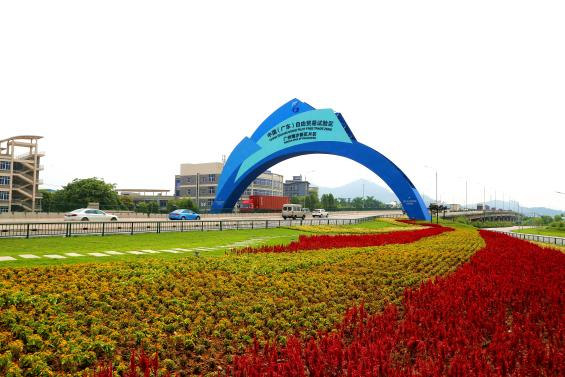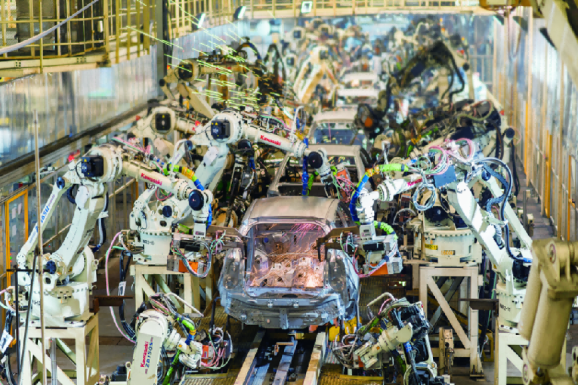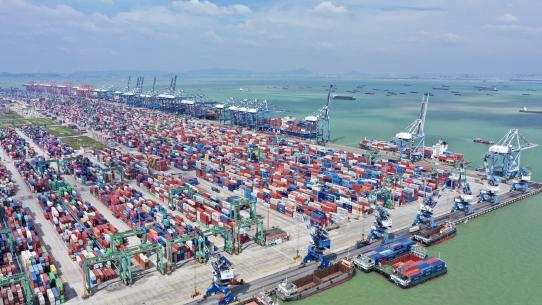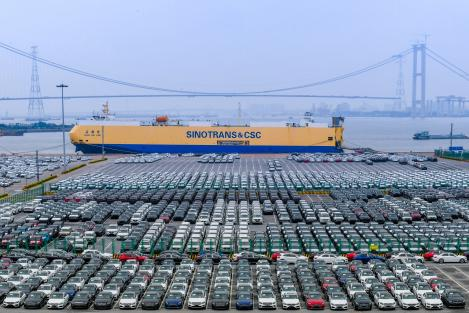Mon Feb 02
The “Two Bays” linkage industry cooperation and pairing meeting is held Build two-way investment platform for precise pairing
 2022-09-29
2022-09-29
The “Two Bays” linkage industry cooperation and pairing meeting for the Guangdong-Hong Kong-Macao Greater Bay Area (GBA) and the Beibu Gulf Economic Zone was held in Nanning, Guangxi on September 14. Organized by the People’s Government of Guangxi Zhuang Autonomous Region, the meeting invited government officials from the Guangxi Zhuang Autonomous Region Investment Promotion Bureau, the Development and Reform Commission, the Beibu Gulf Office, the Department of Commerce of Guangdong Province, as well as representatives of target enterprises in key industries in the GBA to discuss and promote the interconnection, industrial coordination and win-win cooperation between the GBA and the Beibu Gulf Economic Zone. Nansha Demonstration Zone of Creative Promotion of Import Trade, as the core area located in the geographical center of the GBA and has the advantages of its location and port, was invited to this event and make a presentation.
It is learned that the linkage of Beibu Gulf Economic Zone and the adjoining GBA are becoming a key driver for a new round of economic growth. In recent years, Nansha has shown a strong momentum of development, and has formed a new pattern of development featuring “three zones and one center” (the State-level New Area, the Pilot Free Trade Zone, the Demonstration Zone for Comprehensive Cooperation among Guangdong, Hong Kong and Macao, and the Guangzhou Sub-Center as a gateway hub). It plays a demonstration and leading role in innovative development. Riding on the wave of the construction of the GBA, Nansha benchmarks the world-class bay area, embarking on a new journey of development. Through this conference, Nansha will share business opportunities with the beautiful Guangxi, build a two-way investment platform for precise pairing between the two places, and build the “Greater Bay Area - Beibu Gulf Economic Zone - ASEAN” cross-border industrial chain and supply chain.
Standing at the center of the Bay Area, and jointly develop a high-standard gateway for opening up
In June this year, the State Council issued the Overall Plan for Promoting Comprehensive Cooperation among Guangdong, Hong Kong and Macao by Further Deepening Opening-up in Nansha District of Guangzhou (hereinafter referred to as the “Overall Plan of Nansha”), which lays a solid foundation for Nansha to better play a leading role in the building of the GBA by promoting comprehensive cooperation among Guangdong, Hong Kong and Macao, and building a major strategic platform with global perspective that is based on the Greater Bay Area and in collaboration with the two Special Administrative Regions. It can be seen that Nansha’s status as the core strategic gateway to the GBA becomes increasingly prominent.


At the meeting, Chen Junyi, member of the Party Group and Deputy General Director of the Bureau of Commerce of Nansha Economic and Technological Development Zone of Guangzhou, said that Nansha harnesses the advantages of its location, policy and innovation ability giving full play to the “Overall Plan of Nansha” as a guidance. Being the pilot free trade zone and the comprehensive bonded zone, Nansha has become one of areas with the highest degree of openness and the greatest development potential in China. As an important foundation for co-building a high-standard gateway for opening up, Nansha has reached a new height as the gateway hub. Nansha Port Area in Guangzhou has become the largest comprehensive port area with the most extensive services in South China. It features the world’s first automated terminal equipped with Beidou navigation system and Asia’s largest cruise home port complex. It is a multimodal transport hub integrating sea, land, air and rail transport in the Greater Bay Area. Its 150 foreign trade routes reach more than 200 port cities around the world. It operates 125 foreign trade routes with RCEP member states, and 118 shipping routes connecting ASEAN member states such as Singapore, Thailand, Malaysia, and Vietnam.
In addition, innovative policies boost trade development. Nansha has been approved as a general taxpayer for value-added tax in the comprehensive bonded zone and a pilot zone for high-standard opening up for cross-border trade and investment. It implements preferential tax policies in terms of international shipping insurance and tax rebate at the port of departure. It is the first pilot free trade zone in China to take integrated innovative measure benchmarking against RCEP and CPTPP. Meanwhile, new types of foreign trade are flourishing. The bonded import of cross-border e-commerce in Nansha accounts for one fifth of the nation’s total. Nansha ranks second in the country in terms of the number of parallel imported cars. It has become the largest aircraft and ship leasing cluster in South China and the largest distribution center of engineering plastics in Asia. The airport freight sharing center achieves sea-air and land-air multimodal transport in collaboration with airports in the Greater Bay Area. The South China Distribution Center of Public Bonded Pharmaceutical has been launched as a “one-stop” distribution center.
Chen Junyi said that through the communication and exchange of this meeting, Nansha District hopes to work with the Beibu Gulf city cluster to foster cooperation in advanced manufacturing, modern service and other fields, so as to promote the coordinated industrial development and jointly build the largest gateway for opening up in South China.
The two bays link the whole world, with Nansha as the hub
In recent years, Nansha Port has made continuous progress in connecting the vast hinterland in China and the international market. It is moving towards becoming an international shipping logistics hub. Nansha Port has opened up an important corridor leading Guangzhou to the sea. The innovative models such as sea-rail transport and “GBA fast custom clearance” have upgraded the functions of Nansha Port in linking the domestic and international markets.
Guangzhou Port Group seizes the new opportunities for foreign trade presented by the Belt and Road Initiative and the RCEP by increasing the number of foreign trade liner routes and expanding the source of featured goods from the hinterland. Since the beginning of this year, Guangzhou Port Group has additionally increased 15 foreign trade liner routes, bringing the total to 156 foreign trade liner routes, including 150 in Nansha Port Area. Nansha has basically realized daily shipping to major ports in Southeast Asia such as Singapore, Port Klang, Laem Chabang, Ho Chi Minh, Haiphong, and Manila. It has also increased the number of liner routes to RCEP member states such as Myanmar and Australia. Guangzhou Port Group has 129 routes reaching the Belt and Road countries and 87 routes leading to RCEP member states.
The Overall Plan of Nansha proposes integrating the shipping resources of the GBA. As the “two bays” are linked, Nansha will drive the Greater Bay Area and the Beibu Gulf Economic Zone to participate in the implementation of the Belt and Road Initiative. It will more boldly promote reform and opening up at a higher starting point, improve its functions as an international shipping and trade hub, and create an important node connecting domestic and international circulation.
Closer tie of the “two bays” and a new pattern of all-round opening up and development
The Beibu Gulf City Cluster leads to the southwest region and borders the GBA and Southeast Asia. As a place for China’s opening-up by the coast and at the border, Beibu Gulf has a similar geographical position with Nansha and has competitive industries complementary with Nansha. Recently, the first sea-rail intermodal container train travelling from Guangxi to Nansha Port Area in Guangzhou has been put into service. With a railway distance of about 1,000 kilometers, it takes only 4 days to travel from Liuzhou to Nansha Port, 20% less of the cost by road transport. There is more efficient connectivity between the Beibu Gulf City Cluster and the GBA. 

Next, the Greater Bay Area and the Beibu Gulf will harness the port resources and shipowners’ capacity, trying to build a “Two Bay Express”. With Qinzhou and Nansha Ports as basic ports and hubs, it will cover ASEAN and the central and western China as well as the Pearl River Delta region for win-win shipping services. At the same time, Nansha District will work with the Beibu Gulf City Cluster to foster cooperation in advanced manufacturing, modern service, etc., promote the linked industrial development, and jointly build the largest gateway for opening up in South China.
Company:bingo integrated marketing
Contact Person:Howard Lau
Email:howard.lau@imbingo.com
Website:www.imbingo.com
Telephone:8620-83713317
City:Guangzhou,China
Address:14G, Yinhai Bld, No.299, Yanjiang Rd, Yuexiu, Guangzhou, Guangdong, China
डिस्क्लेमर: यह लेख अन्य मीडिया से पुन: पेश किया गया है। रिप्रिंट करने का उद्देश्य अधिक जानकारी देना है। इसका मतलब यह नहीं है कि यह वेबसाइट अपने विचारों से सहमत है और इसकी प्रामाणिकता के लिए जिम्मेदार है, और कोई कानूनी जिम्मेदारी वहन नहीं करती है। इस साइट पर सभी संसाधन इंटरनेट पर एकत्र किए गए हैं। साझा करने का उद्देश्य केवल सभी के सीखने और संदर्भ के लिए है। यदि कॉपीराइट या बौद्धिक संपदा उल्लंघन है, तो कृपया हमें एक संदेश छोड़ दें।




